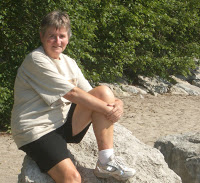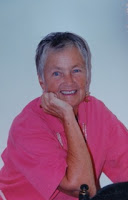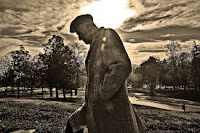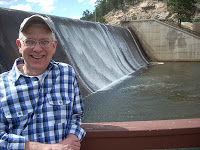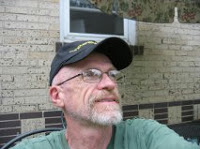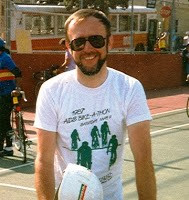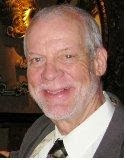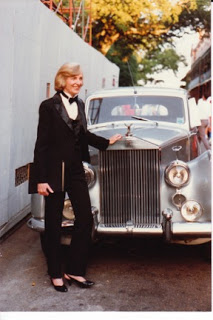I simply do not like
baseball caps. Maybe it’s no more than the fact that I grew up in a land
without them; maybe it’s simply that they are, to me, and I apologize to the
many of you, including my beautiful Betsy, who wear the things, the least
flattering of headgear – though I can think of some very close seconds, like
the British flat cap, or those German and Russian military caps of WW11 with
the exaggeratedly high fronts. But really, baseball caps are everywhere. If
some variety of hat had to go viral ….. no, that’s the wrong term: I
occasionally become over-excited by modern idiom! … had to become universal,
why not, say, the cowboy hat? Most people are enhanced by a jaunty Stetson. Or
a variation on one of many military caps such as the Aussie Slouch or the U.S.
army cap with that sexy curved bill? No! The entire world, or the greatest part
of it, had to go for the baseball cap, or, even worse, its offspring the
trucker hat with that flat bill, high foam front panel, and adjustable mesh in
the back. Those are the ones I really dislike; mostly worn by Bubba and
guaranteed to make the most modest, most harmless, of men, look like a
rapist/mugger and a woman (why would a woman wear one? But they do!)
resemble an escapee from the nearest Dickensian madhouse.
baseball caps. Maybe it’s no more than the fact that I grew up in a land
without them; maybe it’s simply that they are, to me, and I apologize to the
many of you, including my beautiful Betsy, who wear the things, the least
flattering of headgear – though I can think of some very close seconds, like
the British flat cap, or those German and Russian military caps of WW11 with
the exaggeratedly high fronts. But really, baseball caps are everywhere. If
some variety of hat had to go viral ….. no, that’s the wrong term: I
occasionally become over-excited by modern idiom! … had to become universal,
why not, say, the cowboy hat? Most people are enhanced by a jaunty Stetson. Or
a variation on one of many military caps such as the Aussie Slouch or the U.S.
army cap with that sexy curved bill? No! The entire world, or the greatest part
of it, had to go for the baseball cap, or, even worse, its offspring the
trucker hat with that flat bill, high foam front panel, and adjustable mesh in
the back. Those are the ones I really dislike; mostly worn by Bubba and
guaranteed to make the most modest, most harmless, of men, look like a
rapist/mugger and a woman (why would a woman wear one? But they do!)
resemble an escapee from the nearest Dickensian madhouse.
O.K. So the world is,
for whatever incomprehensible reason, obsessed with variations of the American
baseball cap. But why do they proudly wear them complete with American logo;
almost invariably a sports team. Young Russians, Brits, Australians, now even
Chinese, strut their stuff under caps proudly proclaiming Red Sox or White Sox
or New Orleans Saints, most often accompanied by a t-shirt emblazoned with
Notre Dame or S.M.U. If you must adopt American clothes, why not, at least,
proclaim the Tchaikovsky Moscow State Conservatory, or the
Tsinghua University of Beijing?
for whatever incomprehensible reason, obsessed with variations of the American
baseball cap. But why do they proudly wear them complete with American logo;
almost invariably a sports team. Young Russians, Brits, Australians, now even
Chinese, strut their stuff under caps proudly proclaiming Red Sox or White Sox
or New Orleans Saints, most often accompanied by a t-shirt emblazoned with
Notre Dame or S.M.U. If you must adopt American clothes, why not, at least,
proclaim the Tchaikovsky Moscow State Conservatory, or the
Tsinghua University of Beijing?
I suppose, when it
comes down to it, it’s all about marketing; the U.S probably takes Best of
Breed. But I do get angry when people in other countries sigh, shake their
heads, and regret ‘the Americanization of everything,’ placing the blame firmly
on the doorstep of the United States.
comes down to it, it’s all about marketing; the U.S probably takes Best of
Breed. But I do get angry when people in other countries sigh, shake their
heads, and regret ‘the Americanization of everything,’ placing the blame firmly
on the doorstep of the United States.
I hold our country
responsible for many things of which I am not proud, but, please! We don’t
force anyone to wear these clothes any more than we forced the world to install
over 33,000 McDonalds, and frequently in the most inappropriate places. No, we
did not invade Poland and force them to put a McDonalds in a historic medieval
vault in Krakow, or Russia to impose what claimed to be, at the time I visited
it, anyway, the most exotic McDonalds in the world. It’s in the St. Petersburg
railway station in a cavernous space with polished marble floors, exquisite
woodwork, and beautiful chandeliers hanging from a high, arched, beamed,
ceiling.
responsible for many things of which I am not proud, but, please! We don’t
force anyone to wear these clothes any more than we forced the world to install
over 33,000 McDonalds, and frequently in the most inappropriate places. No, we
did not invade Poland and force them to put a McDonalds in a historic medieval
vault in Krakow, or Russia to impose what claimed to be, at the time I visited
it, anyway, the most exotic McDonalds in the world. It’s in the St. Petersburg
railway station in a cavernous space with polished marble floors, exquisite
woodwork, and beautiful chandeliers hanging from a high, arched, beamed,
ceiling.
People tut-tut over the
amount of ‘American rubbish’ on T.V. across the world, but we don’t hold a gun
to the BBC producer’s head, and most certainly not to the head of Russian-controlled
TV. Yet, in the early 1990’s when I was
there, they were glued to already outdated productions of ‘Dallas’ and ‘The
Young and the Restless,’ and ‘Dynasty.’ Gazing obsessively at the imaginary
American way of life, or at least one experienced by very few of us, they
proudly wore their New York Jets ball caps and their University of Michigan
tees. I suppose it was all part of the dream. Free at last, they could be
anything: anybody.
amount of ‘American rubbish’ on T.V. across the world, but we don’t hold a gun
to the BBC producer’s head, and most certainly not to the head of Russian-controlled
TV. Yet, in the early 1990’s when I was
there, they were glued to already outdated productions of ‘Dallas’ and ‘The
Young and the Restless,’ and ‘Dynasty.’ Gazing obsessively at the imaginary
American way of life, or at least one experienced by very few of us, they
proudly wore their New York Jets ball caps and their University of Michigan
tees. I suppose it was all part of the dream. Free at last, they could be
anything: anybody.
One universality which
puzzles me is the world-wide use of the word fuck. You see it scrawled
on walls everywhere, or at least in every country I have been in, and hear it
used by people who, apparently, speak not one more word of English. You hear an
endless stream of conversation in another language, and it is almost invariably
punctuated with the only words you can understand; an occasional fuck or
fucking. Why in the world this particular word has become so
wide-spread, I haven’t a clue though probably some linguist somewhere is, even
as I write this, doing his or her Ph.D. on this very subject.
puzzles me is the world-wide use of the word fuck. You see it scrawled
on walls everywhere, or at least in every country I have been in, and hear it
used by people who, apparently, speak not one more word of English. You hear an
endless stream of conversation in another language, and it is almost invariably
punctuated with the only words you can understand; an occasional fuck or
fucking. Why in the world this particular word has become so
wide-spread, I haven’t a clue though probably some linguist somewhere is, even
as I write this, doing his or her Ph.D. on this very subject.
Yeah, yeah, call me old
fashioned. but I do have a certain yearning for the days when clothes told a
story. (And of course, come to that, when the F word was not so
prevalent!) “Clothes and manners do not make the man,” said Henry Ward Beecher.
But clothes did make the man, at least in the eye of the beholder. Days gone
by, you could tell your bank manager from your milkman from your doctor by his
clothes. In that sense, they did indeed make the man. I don’t mean only when he
was at work, but when he was not. Now, if your plumber, financial advisor, and
grocery clerk walk their dog in the park, they probably all wear blue jeans
with tees proclaiming Rice University and ball caps bearing the Florida Gators’
logo.
fashioned. but I do have a certain yearning for the days when clothes told a
story. (And of course, come to that, when the F word was not so
prevalent!) “Clothes and manners do not make the man,” said Henry Ward Beecher.
But clothes did make the man, at least in the eye of the beholder. Days gone
by, you could tell your bank manager from your milkman from your doctor by his
clothes. In that sense, they did indeed make the man. I don’t mean only when he
was at work, but when he was not. Now, if your plumber, financial advisor, and
grocery clerk walk their dog in the park, they probably all wear blue jeans
with tees proclaiming Rice University and ball caps bearing the Florida Gators’
logo.
Perhaps, I muse, if we
all dress alike we will find it harder to go to war against each other, though
I confess I have seen little evidence of this so far. And I do regret the
individuality.
all dress alike we will find it harder to go to war against each other, though
I confess I have seen little evidence of this so far. And I do regret the
individuality.
When I was in school we
used to watch, once in a while as a special treat in geography class, an old
grainy jerky black and white film released from an 18″ diameter reel. It
showed workers collecting rubber in Brazil, or farming pineapples in Hawaii, or
cutting sugar cane in Jamaica. They dressed very differently depending on their
country. If we see a cable documentary about such activities today, chances are
the majority will be sporting Cardinals or Dodgers caps and Harvard or M.I.T. tee-shirts.
used to watch, once in a while as a special treat in geography class, an old
grainy jerky black and white film released from an 18″ diameter reel. It
showed workers collecting rubber in Brazil, or farming pineapples in Hawaii, or
cutting sugar cane in Jamaica. They dressed very differently depending on their
country. If we see a cable documentary about such activities today, chances are
the majority will be sporting Cardinals or Dodgers caps and Harvard or M.I.T. tee-shirts.
I have to hand it to
the countries of the Islamic world. They are almost alone in refusing to change
their traditional dress, for which I admire them. On the other hand, I abhor
the way women are, for the most part, treated, and forced to dress. I find
myself wishing and hoping that somehow some of these women are concealing a
Baltimore Colts cap and bright orange Denver Broncos tee-shirt beneath the
burqa – well, it would be a beginning, a tiny hint of freedom, wouldn’t it? –
but somehow cannot imagine it.
the countries of the Islamic world. They are almost alone in refusing to change
their traditional dress, for which I admire them. On the other hand, I abhor
the way women are, for the most part, treated, and forced to dress. I find
myself wishing and hoping that somehow some of these women are concealing a
Baltimore Colts cap and bright orange Denver Broncos tee-shirt beneath the
burqa – well, it would be a beginning, a tiny hint of freedom, wouldn’t it? –
but somehow cannot imagine it.
You know what?
In writing this, I have
talked myself round! Maybe the universal Atlanta Braves cap and Ann Arbor tee
is not so bad. We can all, in many countries and in these times, dress more or
less however we please, and after all, knowing a person’s social status by the
clothes they wear is in fact nothing desirable or positive at all. And being
able to identify a person’s nationality in the same manner means little
individual choice is available. So, now I think it all through, baseball caps
don’t look so bad after all. If they cover the world it is because individuals
have chosen them. I fear I shall never be able to find them aesthetically
appealing, but perhaps they can be, to me, a rather unattractive symbol of
freedom.
talked myself round! Maybe the universal Atlanta Braves cap and Ann Arbor tee
is not so bad. We can all, in many countries and in these times, dress more or
less however we please, and after all, knowing a person’s social status by the
clothes they wear is in fact nothing desirable or positive at all. And being
able to identify a person’s nationality in the same manner means little
individual choice is available. So, now I think it all through, baseball caps
don’t look so bad after all. If they cover the world it is because individuals
have chosen them. I fear I shall never be able to find them aesthetically
appealing, but perhaps they can be, to me, a rather unattractive symbol of
freedom.
Afterthought
Reading through this I
was overcome by the most horrific of visions!
was overcome by the most horrific of visions!
What if the universal
love for ball caps and that tiresome F word had collided? The world
would be covered in caps saying, simply, and with great lack of originality, FUCK.
love for ball caps and that tiresome F word had collided? The world
would be covered in caps saying, simply, and with great lack of originality, FUCK.
© September 2014
About the Author
I
was born and raised in England. After graduation from college there, I moved to
the U.S. and, having discovered Colorado, never left. I have lived in the
Denver-Boulder area since 1965, working for 30 years at IBM. I married, raised
four stepchildren, then got divorced after finally, in my forties, accepting
myself as a lesbian. I have now been with my wonderful partner Betsy for 25
years.
was born and raised in England. After graduation from college there, I moved to
the U.S. and, having discovered Colorado, never left. I have lived in the
Denver-Boulder area since 1965, working for 30 years at IBM. I married, raised
four stepchildren, then got divorced after finally, in my forties, accepting
myself as a lesbian. I have now been with my wonderful partner Betsy for 25
years.
